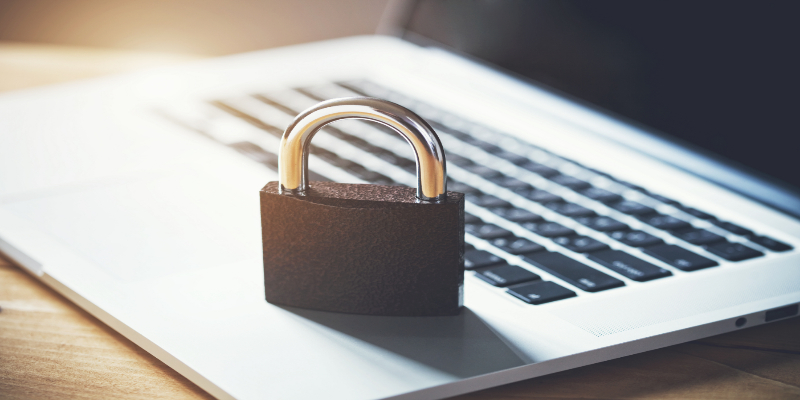Disclaimer: This post may contain affiliate links, meaning we get a small commission if you make a purchase through our links, at no cost to you. For more information, please visit our Disclaimer Page.
Laptops are small, easy to carry and often expensive. It’s also not unheard of for them to get stolen when you leave them unattended.
Laptops and other portable devices are especially vulnerable to theft and loss and should be secured physically. The majority of laptops and desktop computers have built-in cable lock slots. Moreover, an anti-theft backpack also ensures laptop safety while traveling.
You’ve also read of stolen laptops on the news or from friends and coworkers. No one expects their laptop to be stolen. But it does happen when I am least expecting it.
People may find their car trunk broken into, note that their laptop isn’t waiting on the other side of airport security, or go to the nearest coffee shop for a refill only to turn around and discover their laptop has vanished.
Here I will discover ways to ensure the physical security of your laptop.
Table of Contents
What Is Laptop Physical Security?
Perhaps you’ve taken the following measures to protect the data on your laptop: You’ve set up a firewall. You keep your antivirus program up to date.
You use a strong password to safeguard your data. You encrypt your data and are far too intelligent to fall for emails requesting personal information.
What about the laptop, though? All it takes is a small diversion for your desktop to disappear. You might lose more than just an expensive piece of hardware if this happens.
The truth is that if your data security isn’t up to scratch, your laptop’s confidential and important details might be a trap for an identity thief.
What Are Examples Of Physical Security?
Defense of individuals, property, and physical objects from acts and events that could cause harm or loss is known as physical security. Physical protection is critical, but it is often ignored in favor of cybersecurity.
Physical security is becoming more sophisticated thanks to innovations like artificial intelligence (AI) and the internet of things (IoT), which means IT and physical security are becoming more intertwined, causing the formation of security teams.
Protecting buildings, people, and property from real world dangers is the goal of physical security. Physical deterrent, identifying intruders, and responding to threats are all part of it.
How Can You Secure A Laptop Physically?
Keep An Eye On It
Treat your laptop as if it were money. Would you turn your back on a wad of cash sitting in a public spot, even if it was just for a minute?
Will you pack it in your carry-on luggage? Is it safe to put it in the backseat of your car? Not. Keep an eye on your laptop as if it were a stack of cash.
In airports, pay attention. As you pass through security, keep an eye on your laptop. Hold on to it before the person in front of you has passed through the metal detector.
Keep an eye out for it as it appears on the other side. The jumble of security checkpoints can provide fertile ground for robbery.
Keep it shut
A security system will make it more difficult for someone to steal your laptop if you’re in the workplace, a hotel, or another public location.
Attach a laptop protection cable to something immovable or a large, difficult-to-move piece of furniture, such as a table or a desk.
Keep It With You
Make sure it’s not on the board. Avoid placing your laptop on the floor anywhere you are in public, whether it’s at a meeting, a coffee shop, or a registration desk.
If you have to put it down, put it between your feet or up against your leg so you don’t lose track of it.
Mind Your Passwords
It can be difficult to remember good passwords or access numbers. Leaving your laptop in a laptop carrying case or on your laptop, on the other hand, is like leaving your keys in your car.
There’s no need to make it simple for a hacker to access your personal or business data.
Remove It From Vehicle
Don’t leave your laptop in the car – not in the trunk, not in the passenger seat. Laptop robbers prefer to target parked vehicles, so don’t make it easier for them by leaving your laptop unattended.
If you must leave your laptop behind, make sure it is hidden. Avoid exposing your laptop to the heat of a parked car in the summer.
Do Rain Check
The weather can be unpredictable many times. You should shield your laptop from the rain if you ride outside or by bicycle during the rainy season. Your laptop is very likely to be damaged if it gets wet.
On a rainy day, there are many options for protecting your laptop:
- Use a waterproof laptop backpack and do not forget to zip it.
- Invest in a rain cover if your backpack isn’t waterproof. They can be scrunched up and stowed for when you’re caught off guard by bad weather.
- Place your laptop in a plastic bag before storing it in your backpack if you don’t have a waterproof sleeve.
- When traveling in the rainy season, make sure your laptop is switched off.
Do Not Leave It Unattended
Don’t put it off “for a minute”. Since your conference colleagues seem to be trustworthy, you can feel safe leaving your laptop unattended while you network during a break.
You can also ask the workers at the coffee shop to keep an eye on your spot while you use the bathroom because they work there and seem good. Don’t leave your laptop unattended for even a moment. If you can, bring it with you, or at the very least use a bag.
In hotels, be cautious. If you’re staying in a hotel, a security cable might not be sufficient. Avoid leaving your laptop unattended in your room. Instead, if your room has one, use the safe.
Consider hanging a “do not disturb” sign on your door if you’re using a locking cable to lock down your laptop or do not have a safe.
Make Some Noise
Make use of whistles and bells. An alarm system can be useful depending on your protection needs. Get a laptop alarm that sounds when the device moves outside of a designated range around you or when there is unwanted motion.
Get A Good Quality Anti-theft Backpack
Wherever you go, take extra precautions to keep your laptop secure from robbers. One of the important accessories you can get for your laptop is a good wallet.
Anti-theft laptop bags have a slightly different design than regular backpacks, and they come with a variety of security features to secure your computer and laptop accessories, but the following are the most important:
- A lock that prevents theft
- Hidden pockets and zippers
- Cut-resistant or slash-proof material
- If you want to put it on the board, there are locking cables.
Anti-theft backpacks are typically more costly than regular backpacks. There are now more options than ever before, and the price has dropped significantly, as the demand for these bags has increased significantly in past years.
Another factor to consider when selecting a laptop bag is whether or not it would be able to shield your laptop from physical harm. Get a bag with bottom padding to protect the hard drive from bumps and shocks.
Keep It Clean
Although many of us are great at keeping our laptops clean in the digital world, it’s all too easy to forget about the physical cleaning of your computer.
It refers to cleaning the computer, keyboard, and other items you use daily. A laptop that is filthy and dusty will overheat and break.
To reduce the risk and keep your machine dust and germ-free, conduct a physical clean regularly.
Conclusion
What to do if you need assistance? If your laptop is stolen, contact the URI Police Department or local authorities right away. If it’s your work laptop that’s gone missing, tell your boss right away.
You may also want to look into the FTC’s data breach details for companies.


